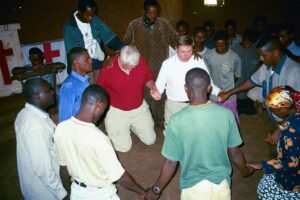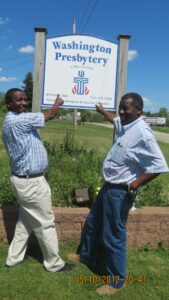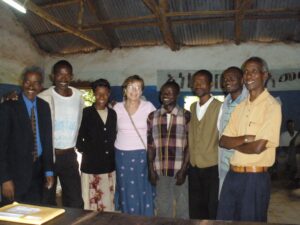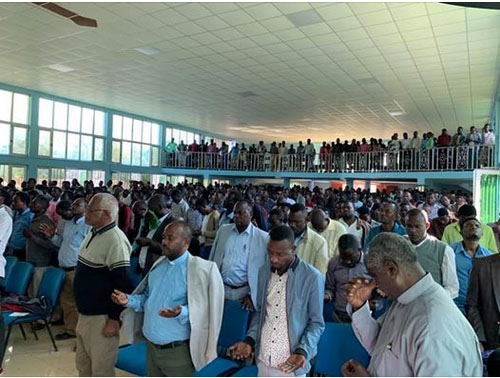
Washington Presbytery’s Ron Watkins (red shirt) and Rusty Salminen (to the right of Ron in white shirt) kneel in a prayer circle with their brothers and sisters from Ethiopia during an overseas visit that is part of a 30-year partnership between the presbytery and South West Bethel Synod.
While the partnership between Washington Presbytery and the South West Bethel Synod of the Ethiopian Evangelical Church has officially been active for 30 years, that relationship started long before 1993. In fact, the ties between the two Presbyterian mid councils can be traced back more than 50 years earlier.
The denomination originally voted to expand its outreach from Egypt into nearby Ethiopia in 1869. However, it took another 80 years for American Presbyterians to finally make their way into southwestern Ethiopia. This charge in the 1940s was led by Charles Haspels, a missionary from Washington Presbytery who established the mission station that has grown into a synod of more than half a million members.
“We didn’t know about that,” admitted Rusty Salminen, a historian of the partnership for Washington Presbytery who has been involved with the Ethiopian alliance since the late 1990s, regarding the presbytery’s early ties to the outreach. “It was something we discovered after the partnership had been going a long time. It has been a realization lately that God has been laying the groundwork for this for more than 150 years. We have had a connection even before we knew about it. It was invisible to us, but it was there.”
That early relationship is just one of the things that has been celebrated this year by Washington Presbytery as it looks back on the three decades of the partnership. The groundwork for the partnership occurred in the late 1980s when the Presbyterian Church (U.S.A.)’s World Mission organization requested that its American congregations and mid councils form partnerships with overseas counterparts. These connections would be “partnerships of understanding” that would involve building friendships, not one that would focus on physical improvements (i.e., construction projects) in these foreign countries.
A committee at Washington Presbytery decided to accept this challenge and landed on the Kaffa Bethel Presbytery in Ethiopia as the region in which it would connect. The African country’s mid council was selected, Rusty said, because at the time it was similar in size to Washington Presbytery, with both having about 30,000 members.
“It was about prayer first of all and anything else that might come out of that,” Rusty recalled. “Development help or other kinds of help would be secondary. The first half of it should be prayer, which is absolutely right and the thing that’s made these partnerships last a long time.”

Ethiopian visitors Gezahegn Bahiru (left) and Sisay Tomas pose with a Washington Presbytery sign during a recent visit to the United States.
Washington Presbytery has also stepped up in times of need in the past 30 years, helping to fund things from sewing machines to automobiles. It has been instrumental in forming an endowment fund to help pay the salaries of seminary instructors and also helped raise money for a clean water initiative.
“When you think about mission overseas you think, ‘Oh, we’re going to help people. They need our help because we have lots of resources and they’re in an impoverished area,’” Rusty said. “You think about what they lack and what we can supply. It’s not an equal relationship when one side is giving and the other side is receiving.
“The whole idea of the partnership is to militate against that, to make sure that it’s mutual prayer first and that you realize that both sides have something they’re bringing, that both sides are benefiting from this,” Rusty added. “We’re really starting to see this now since we are down in numbers and our partner is very aware that they’ve grown massively. They have some things they can share with us that can help us become a little more outwardly focused and change some of the ways that we do things – gently – but lean us into a way that will make us a little more evangelical so that we can start to grow again.”
The Kaffa Bethel Presbytery, as it was called in 1993 when the partnership started, has since grown into the South West Bethel Synod, which encompasses multiple presbyteries and more than 547,000 members. Meanwhile, Washington Presbytery has shrunk to a membership of 4,500 in those same 30 years.
“Realizing that the church has grown hugely, the growth isn’t fueled from the top, it’s from the laymen,” Rusty said. “Every member of the church is an evangelist. How they actually reach out to their friends, neighbors and family are things that we can learn from them. How it is that that church is so evangelical and comparing it to our practices and what we might do that would make us a little bigger. There’s no reason we couldn’t be a presbytery of 250,000 members – the population is enough here that we could be huge, too, if we really were successful in reaching out to people.
“It’s good that the partnership was set up not focused on giving mission funding,” Rusty continued. “That wasn’t the main purpose. There’s a lot more needs for half a million people to serve than there would be for 30,000.”
Fortunately, the change in sizes of the two mid councils hasn’t affected the relationship.
“It (the shift in sizes) hasn’t damaged anything, it hasn’t thrown the partnership off,” Rusty said. “It’s just forced us to be more mindful of the original intent, which is to be partners in prayer first and everything else will follow off of that.
“When you grow to half a million members, there’s just a growing need for pastors for leaders. They’re starting from scratch with people who have only just heard about Jesus for the first time. They need someone to answer their questions. From the beginning that we were partners, this growth has just overtaken everything else.”
Quite possibly the most important thing that has emerged from the partnership is a Bible school that was created to train pastors for the new churches that are springing up to serve the masses. As the number of church attenders has increased, this facility has grown into a seminary to raise the level of education for the pastors who are going through it. The presbytery has raised funds to help build the facility and even sent a pastor to Ethiopia to assist in the training process as well.
A much-needed literacy program is another project Washington Presbytery has helped develop in Ethiopia. Through an annual fall pumpkin sale, congregations in the presbytery raise funds to support this project that teaches Ethiopians the valuable skills of reading and writing. Rusty estimated that the presbytery sends roughly $15,000 a year to Ethiopia to help fund the seminary, literacy program and various other outreaches.

Ginger Wainwright, from Hewitt Presbyterian Church, poses with members of a partner church, Bebeka Bethel Mekane Yesus Congregation.
Rusty, who refers to himself as a “communications liaison” for the partnership, first became involved in the relationship in 1998 when a group from Ethiopia visited Washington Presbytery. Wanting to learn more about the association, he volunteered to be on a committee for the partnership and was immediately hooked. He has visited Ethiopia five times, as the two mid councils schedule visits five years apart, staggering them with the overseas visits from their brothers and sisters. Washington’s next trip to Africa will occur in 2024 and will involve just a handful of people making the commitment for the three- to four-week excursion.
“It’s a wonderful experience,” Rusty said of the trips. “For me personally, the friendships have grown. There are so many people there that I know. And it’s not just them, it’s their children and families. It’s really wonderful to go back and keep up with them through email.
“For most people going, it’s quite a shock. It’s a different culture. It was never colonized. It’s a different language. They have their own language, their own calendar, their own clock. Everything about it is a lot of adjustment for people to make.”
The most memorable part of the trip occurs Sunday morning at church when the American visitors are asked to stand in front of a jam-packed congregation and say a few words. It can be intimidating but is also extremely rewarding.
“One of the things they never forget is the interaction on Sunday morning,” Rusty said. “You feel like you’re at home, and that’s always been the case for me. Sometimes I look down at my feet and the soil and I say, ‘This is Africa.’ It always seems like such an exotic thing to us, but when you’re there it doesn’t seem the least bit exotic, it just feels like home.”
While Washington Presbytery has been involved in this relationship for 30 years, brand-new connections are still available through PCUSA World Mission. There are currently four Presbyterian synods in Ethiopia that do not have American partnerships, and it begins as only a three-year covenant. More information on some of the overseas opportunities can be found by clicking here.

Worshipers stand for a prayer at the Mizan Bethel Mekane Yesus Congregation. It’s not uncommon to see overflow crowds at Ethiopian churches, and this sight is one memory travelers bring home with them.
“What I think Homer Rickabaugh (mission leader for the PCUSA who pushed for the overseas partnerships in the early 1990s) had envisioned is that it does break down those barriers and you realize it’s the one body of Christ,” Rusty said of the partnerships. “Also, it’s a chance to see God in a different way.”
In celebrating the three-decades-long partnership, Washington Presbytery teamed with its Ethiopian brothers and sisters for a time of reflection and prayer in 2023. Thirty young evangelists from two South West Bethel Synod congregations traveled to four towns on four weekends in July. Prayer was mobilized in all 45 congregations of Washington Presbytery and across the U.S. through the Ethiopia Mission Network.
At the same time SWBS was praying in Ethiopia. It prayed for the success of the work, town by town, while here in the States the prayer was for revival and growth in the church in the U.S., and especially in Washington Presbytery. Each Sunday the evangelism teams reported how they had fared, so everyone could share in the event in real time. A video (click here) was also created by Washington Presbytery reviewing the 30 years of the partnership.
It’s been a long journey, but one that has certainly borne many fruit.
“We learn from each other,” Rusty concluded. “We’re able to support one another in various ways, helping to get things overseas or just think about mission and the ideas. It has been very formative and life-changing in terms of seeing the world and your place in it.”
